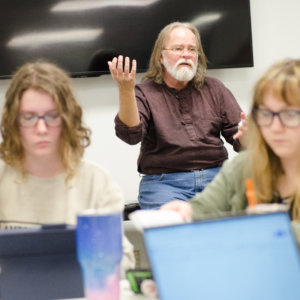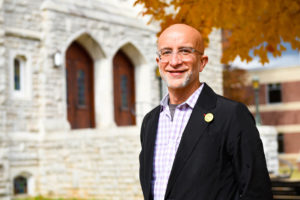A minor in philosophy introduces students to some of the ideas, problems, and methods of philosophers. It introduces careful thinking into some of the biggest problems in our civilization: What is good thinking? What is mind and self? What is real? What is good and right? Students who minor in philosophy at Ozarks typically think through these things, and learn to develop reasonable arguments and to communicate things that matter personally to them.
Degree Outcomes
A philosophy minor enhances a number of majors in preparation for careers that demand careful reasoning: law school, for example, and seminary, depending on what major it is coupled with.
Minors learn to develop rational arguments and to instantiate these in well-reasoned papers, something valuable to all undergraduate and graduate programs, as well as professional preparation in any subject field.
Minor students explore meaning, identity, and ethics for themselves in a way that makes more meaningful their individual professions and careers.
Example Courses
-
PHL 2023: Pursuit of Wisdom
 This course is a translation of the word philosophy. Unlike other introductions to the field, this course uses primary sources from St. Augustine's "Confessions" to Bertrand Russell to examine the principal concepts and arguments from the field.
This course is a translation of the word philosophy. Unlike other introductions to the field, this course uses primary sources from St. Augustine's "Confessions" to Bertrand Russell to examine the principal concepts and arguments from the field. -
PHL 1003: Logic
 This course is the basis for much that is done in this field and most others. It examines how reasoning can be well-developed or can go wrong or be obfuscated by ambiguity, rhetorical devices, or fallacious reasoning in general. What works to persuade us and how can good reasoning clear that up?
This course is the basis for much that is done in this field and most others. It examines how reasoning can be well-developed or can go wrong or be obfuscated by ambiguity, rhetorical devices, or fallacious reasoning in general. What works to persuade us and how can good reasoning clear that up? -
PHL 1013: Ethics
 This course examines both ethical theory from Aristotle to Mill and Kant and feminist thought. It then uses ethical theory to examine what people have argued about moral problems such as euthanasia, abortion, free speech, and hate crime.
This course examines both ethical theory from Aristotle to Mill and Kant and feminist thought. It then uses ethical theory to examine what people have argued about moral problems such as euthanasia, abortion, free speech, and hate crime.
















